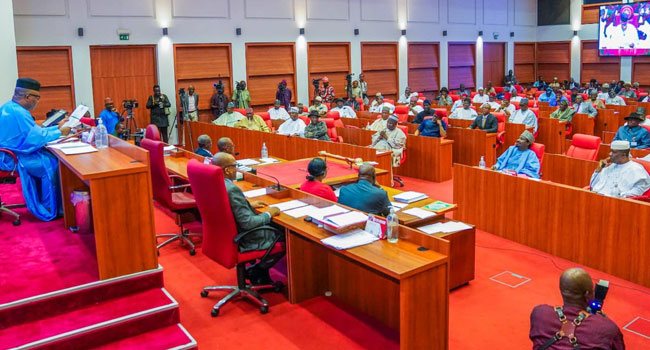The Senate on Wednesday began a heated debate on Nigeria’s deepening security crisis, following a motion by Senator Lola Ashiru (Kwara South) calling for urgent and comprehensive federal action in response to escalating insecurity in Kwara, Kebbi, and Niger states.
Ashiru’s motion highlighted a string of recent attacks, including the abduction of schoolchildren in Kebbi, and raised concerns over alleged troop withdrawals and compromised security operations in affected areas.
Deputy Senate President Barau Jibrin said the security challenges remain surmountable but require international support.
“We should seek assistance from overseas and collaborate with global partners to stem the crisis,” he said.
Senate Leader Opeyemi Bamidele described the current wave of insecurity as a “turning point” that demands decisive, unconventional solutions. While welcoming the rescue of abducted victims, he criticised the lack of clarity on whether any of the attackers were neutralised.
He also cautioned lawmakers against sensationalism, referencing calls in the House of Representatives for the shutdown of the National Assembly in protest of insecurity.
“That is an abdication of responsibility,” Bamidele said, urging the Senate to also examine its internal mechanisms. “If we are asking the President to rejig the security architecture, we must also fix our own. I am not impressed with our Committee on Security and Intelligence. We should rejig it ourselves.”
Opposition Senator Enyinnaya Abaribe rejected attempts to blame past administrations, insisting that the current government must take responsibility for present failures. He questioned reports that troops withdrew shortly before the Kebbi school attack.
“Who ordered their withdrawal? Nobody knows. If I were the Commander-in-Chief, I would demand answers,” he said.
Senate President Godswill Akpabio further raised alarm over alleged internal sabotage, citing reports that the location of a brigadier general killed in Borno was compromised. He also faulted the ease with which bandits invaded the Kebbi school despite prior security advisories and training.
Tensions rose when Senator Seriake Dickson accused the majority caucus of managing—not confronting—the crisis, warning that Nigeria was “losing prestige and integrity before our eyes.” His comments sparked an uproar from APC senators, leading to his microphone being cut off.
Akpabio later condemned attempts by some lawmakers to frame insecurity along religious or sectional lines.
“It is orchestrated to damage the image of democracy. There is nothing like targeting Muslims or Christians. This country is under attack,” he said.
Senator Adams Oshiomhole defended President Bola Tinubu’s efforts, saying the administration was operating under extremely challenging circumstances. He demanded an investigation into the troop withdrawal that preceded the Kebbi school attack.
“Who ordered the military to withdraw? That person should be tried for terrorism,” he said—an action the Senate later adopted as part of its resolutions.
Oshiomhole also decried alleged inconsistencies in the justice system, noting that a convicted terrorist received a 20-year sentence while civilians who killed a bandit in self-defense were sentenced to death.
Meanwhile, some lawmakers renewed calls for the death penalty for kidnappers, signalling a push for harsher deterrent measures amid rising nationwide anxiety.


